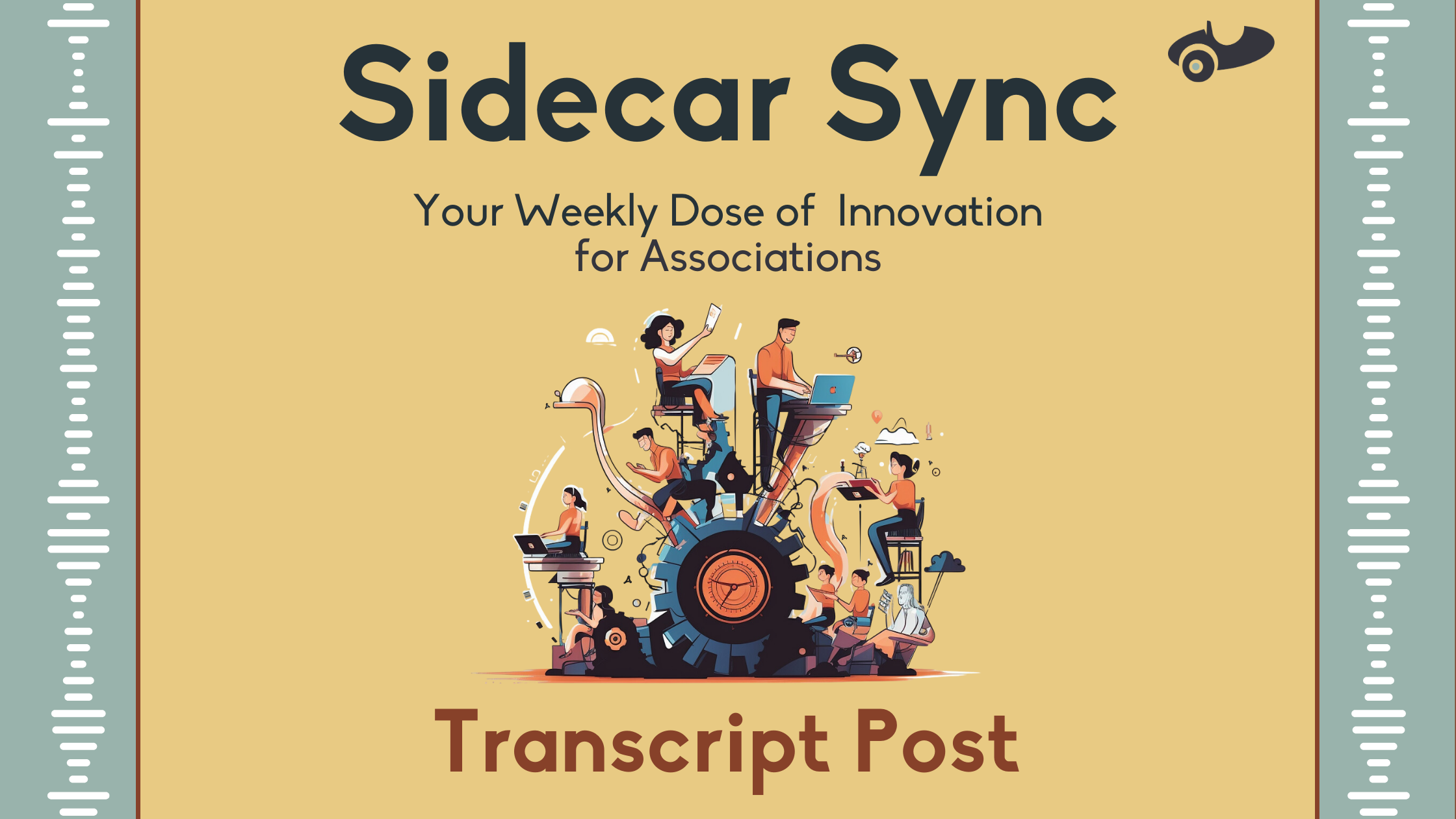Trust: the one thing you don’t want to lose from your members. With the ever-evolving world of generative AI, the balance between innovation and privacy has never been more critical. The Cisco 2024 Data Privacy Benchmark Study sheds light on a crucial trend: 27% of organizations have implemented some sort of AI adoption pause, driven by concerns over privacy and data security. This pause is not a full stop but a moment to reflect on how associations harness AI's power without compromising the trust their members place in them.
Understanding and addressing potential risks, from intellectual property concerns to the unauthorized sharing of sensitive information, requires us to draft comprehensive guidelines and policies, critically evaluate the vendors we use, and invest in education and awareness for our staff.
Let’s dive into the intersection of generative AI and privacy risk and attempt to answer the questions: How do we harness the benefits of AI without losing sight of our ethical compass? How can we ensure that in our quest for innovation, the privacy of members remains top priority?
Navigating Generative AI: Insights for Associations
The integration of generative AI into association management practices is at an exciting crossroads, but it comes concerns about data and privacy risks. The Cisco 2024 Data Privacy Benchmark Study reveals that 27% of organizations have temporarily restricted generative AI use among their workforce, primarily due to concerns around privacy and data security. These findings demonstrate the importance of being judicious in how these powerful tools are deployed. For associations, which often handle sensitive data, it is important to emphasize the need for a thoughtful approach to leveraging AI technologies—balancing innovation with integrity.
Understanding and Addressing Potential Risks
With many organizations, including associations, implementing controls on data inputs (63%) and restrictions on AI tool usage (61%), the path forward involves embracing generative AI with informed strategies. The potential risks—ranging from intellectual property concerns to the unauthorized sharing of sensitive information—are manageable with the right safeguards in place. This proactive stance is about ensuring that AI tools are used in ways that respect member privacy and uphold the trust members place in associations.
Embracing AI with Informed Confidence
The Cisco study's insights should serve not as a deterrent but as a guide for associations to harness the benefits of generative AI responsibly. The identified challenges are not insurmountable barriers but rather considerations that can inform better practices in AI adoption. With 92% of professionals recognizing the unique challenges of generative AI, associations have the opportunity to lead by example—demonstrating how to leverage AI ethically and effectively.
Related: Top 6 AI Guidelines For Associations To Follow
Learn More >
The Unique Challenge of Generative AI for Associations
Generative AI, with its vast potential to revolutionize how associations operate and engage with members, brings forth a set of unique challenges that demand innovative approaches to risk management. According to the Cisco 2024 Data Privacy Benchmark Study, an overwhelming 92% of security and privacy professionals acknowledge that the nature of generative AI presents novel challenges unlike anything before, necessitating new strategies and frameworks to mitigate risks effectively.
The capabilities of generative AI to create content, automate tasks, and generate insights from data are unprecedented. However, this power comes with a set of concerns that are distinct from traditional digital tools. For associations, understanding and addressing these challenges is crucial to unlocking the technology's potential without compromising on their values of trust and privacy.
Legal and Intellectual Property Concerns: The ability of generative AI to produce new content based on vast datasets raises questions about copyright infringement and intellectual property rights. Associations must navigate these legal waters carefully, ensuring that AI-generated content does not violate existing laws or misuse proprietary information.
Unauthorized Information Sharing: The risk of sensitive data being inadvertently shared or exposed is heightened with generative AI. This includes confidential information about the association's internal processes, employee details, and member data. Associations must implement robust data governance policies to control what information is fed into AI systems and monitor how it is used.
Accuracy of AI-Generated Content: While generative AI can produce content at scale, there's the risk of inaccuracies or misrepresentations, which can lead to misinformation or harm the association's credibility. Ensuring the reliability and accuracy of AI-generated outputs is paramount, requiring continuous oversight and validation processes.
The unique challenges posed by generative AI call for a proactive and informed approach from associations. Developing new risk management techniques involves a deep understanding of AI technologies, clear guidelines on their ethical use, and a commitment to transparent communication with members about how their data is being used. By focusing on these areas, associations can not only mitigate the risks associated with generative AI but also harness its capabilities to foster innovation, improve member engagement, and streamline operations. The goal is to embrace the future of technology with confidence, ensuring that advancements in AI are aligned with the core values and objectives of the association.
Related: The Power of Custom GPTs for Associations
Learn More >
The Crucial Role of Data Protection for Associations
In the intricate web of member relationships, trust is both the starting point and the end goal. Associations are entrusted not just with membership dues but with personal and professional data. The commitment to safeguard this information is paramount, as effective data protection directly influences member retention and trust. It's a clear signal to members that their data is not only secure but valued and respected, reinforcing their decision to remain part of the association.
For associations, the journey toward robust data protection involves more than compliance with privacy laws; it's about embedding privacy into the DNA of the organization. This means adopting a proactive stance on data security, ensuring that policies, practices, and member communications are all aligned with the highest standards of data ethics and privacy.
By prioritizing data protection, associations can navigate the complexities of the digital age with confidence, ensuring that their members' data is shielded from risks and that their trust is well-placed. In doing so, associations not only comply with legal requirements but also, and more importantly, build a foundation of trust that is critical for long-term member engagement and loyalty.

Implementing Effective Guidelines and Policies for Generative AI in Associations
As associations venture further into the realm of generative AI, establishing a comprehensive framework of guidelines and policies becomes indispensable. This framework serves as a navigational compass, ensuring that the deployment of AI tools is both ethical and effective, thereby preventing misuse while fostering an environment of innovation and growth.
- Crafting Clear and Comprehensive Guidelines : The first step in harnessing the power of generative AI responsibly is the creation of clear guidelines. These guidelines must delineate what is permissible and what is not, setting boundaries for the use of AI within the association. This clarity is crucial in preventing the misuse of AI tools, which can range from the unintentional sharing of sensitive information to the unethical manipulation of data. By defining acceptable practices, associations can encourage the productive and innovative use of AI, ensuring that these tools contribute positively to the association's goals and member services.
- Fostering Innovation Through Sandbox Environments: A key strategy in the responsible adoption of AI technologies is the establishment of sandbox environments. These controlled settings allow for safe experimentation with AI tools, enabling staff to explore their capabilities without the risk of affecting live systems or exposing member data. Sandboxes serve as a testing ground for new ideas and applications, providing valuable insights into how AI can be best utilized to serve the association's needs while maintaining stringent data protection standards.
- Navigating Licensed vs. Unlicensed AI Tools: An essential aspect of AI governance is the distinction between licensed and unlicensed AI tools. Clear policies must be put in place regarding the use of these tools, with a strong preference for licensed options. Licensed tools often come with vendor support, security assurances, and compliance with data protection regulations, offering a safer and more reliable framework for AI integration. In contrast, unlicensed tools may pose significant risks, from security vulnerabilities to legal complications arising from copyright infringement or data privacy breaches.
Associations must carefully evaluate AI tools, opting for solutions that not only meet their operational requirements but also align with ethical standards and data protection laws. This evaluation process should be guided by established policies, ensuring that every tool is vetted for compliance and security before being integrated into the association's digital ecosystem.

In the quest to integrate generative AI into their operations, associations stand at a crossroads between various AI tools, each offering different levels of capability, security, and compliance. The choice between consumer-grade free tools and enterprise-grade AI solutions is pivotal, directly impacting the association's ability to protect member data and comply with privacy standards.
Consumer-Grade vs. Enterprise-Grade AI Solutions
- Consumer-Grade Free Tools are readily accessible and offer a low-cost entry point into the world of AI. However, they often lack the robust security features and dedicated support that associations require to safeguard sensitive data. While these tools can be appealing for small-scale or preliminary explorations into AI, their use raises concerns about data privacy, security vulnerabilities, and the potential for data misuse.
- Enterprise-Grade AI Solutions, on the other hand, are designed with security, scalability, and compliance in mind. These solutions typically come with higher price tags but offer extensive support, including customer service and technical assistance, and are built to comply with stringent data protection laws. For associations, the investment in enterprise-grade solutions translates into enhanced data security, better alignment with privacy standards, and a commitment to member trust and confidentiality.
The Critical Role of Vendor Evaluation
Choosing the right AI tool extends beyond comparing features and prices; it involves a thorough evaluation of vendors to ensure they meet the association's standards for data protection and privacy compliance. This evaluation should encompass several key areas:
- Security Measures: What security protocols does the vendor implement to protect data? Are there mechanisms in place to prevent unauthorized access and data breaches?
- Compliance with Privacy Laws: Does the vendor comply with relevant privacy regulations, such as GDPR or CCPA? How does the vendor handle data storage and processing to ensure compliance?
- Data Usage Policies: Understand how the vendor uses the data input into their AI tools. Are there safeguards to prevent the misuse of sensitive information?
- Support and Reliability: Evaluate the level of support offered by the vendor, including responsiveness to inquiries and the availability of technical assistance.
For associations, the deliberate selection of AI tools, guided by a comprehensive vendor evaluation process, is essential. This careful approach ensures that the tools not only enhance operational efficiency and member engagement but also uphold the highest standards of data protection and privacy. By prioritizing these considerations, associations can navigate the complexities of AI integration with confidence, ensuring their technology choices align with their commitment to member trust and data security.
Related: The Ultimate AI Toolkit for Associations
Learn More >
The Benefits of Investing in Learning Resources and Training
To cultivate an environment where AI can be used effectively and ethically, associations should invest in learning resources and training programs tailored to their staff's needs. These resources could range from online courses and workshops to webinars and expert talks that demystify AI technologies and explore their practical applications within the context of associations.
Training programs should not only cover the technical aspects of AI but also delve into ethical considerations, data protection best practices, and strategies for mitigating risks. By empowering staff with a well-rounded understanding of AI, associations can ensure that their teams are not only proficient in using AI tools but are also vigilant about safeguarding member data and adhering to privacy standards.
An educated approach to AI adoption brings numerous benefits. It enhances the ability of staff to contribute to the development of AI guidelines that are both practical and forward-thinking. Educated teams are better positioned to identify the most beneficial AI applications for their association, advocate for responsible data use, and communicate effectively about AI initiatives with members.
Moreover, education and awareness are key to fostering an organizational culture that views AI as an ally in achieving strategic objectives rather than a challenge to be navigated. As associations invest in the education of their staff, they build a foundation of knowledge that supports the responsible and innovative use of AI technologies, paving the way for a future where associations and AI technologies thrive together.
If you're searching for a meaningful AI learning opportunity, whether individually or to offer your team, consider exploring our AI Bootcamp for Associations, an on-demand AI course designed for the busy association professional.

Embracing Generative AI with Responsibility and Vision
For all organizations, the journey ahead is filled with both unprecedented opportunities and significant challenges. The discussions surrounding the Cisco 2024 Data Privacy Benchmark Study underscore a critical narrative: the path to leveraging AI's capabilities is paved with the imperative to uphold privacy and security. The essence of this journey lies in recognizing that the innovative leap into AI does not exist in a vacuum; it intersects deeply with the foundational values of trust and privacy that bind members to associations.
Associations are called upon to not only envision the possibilities that AI technologies bring but also to navigate their complexities with a comprehensive strategy. If you’re interested in diving deeper into your association’s AI goals join us for a free webinar: Unleashing Transformation: Assessing Your Association’s AI Potential March 7 at 10 AM CT/11 AM ET.







